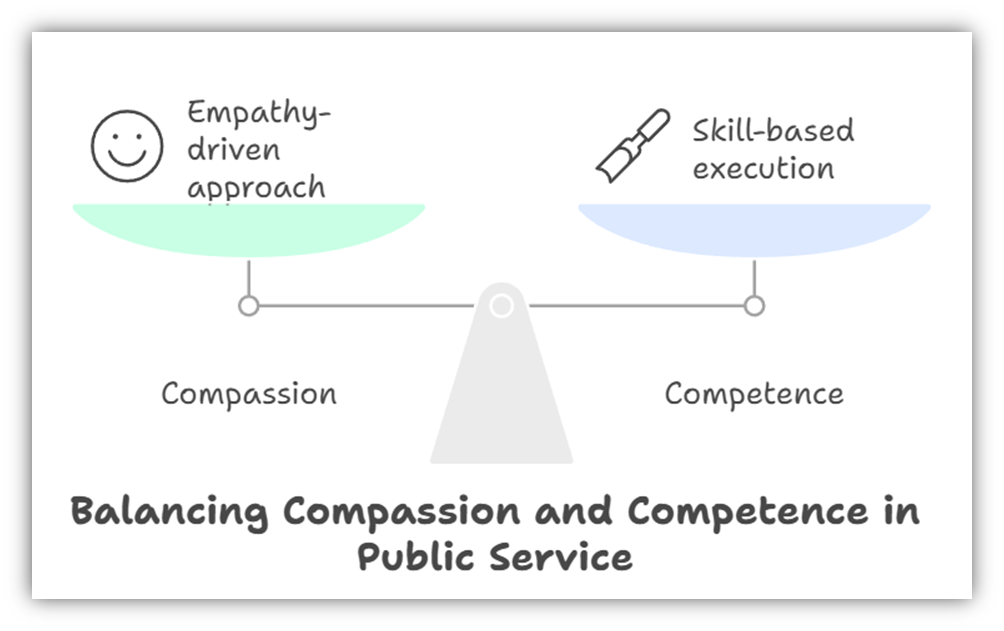- Filter By :
- Theoretical Questions
- Case Studies
-
Q. "Compassion without competence in public service can lead to greater harm than good."Discuss this statement with reference to emotional intelligence in governance. (150 words)
02 Jan, 2025 GS Paper 4 Theoretical QuestionsApproach
- Introduce the answer by defining compassion, competence and emotional intelligence
- Give Importance of Compassion in Governance
- Highlight the Risks of Compassion Without Competence
- Delve into the Consequences of Neglecting Competence
- Give Role of Emotional Intelligence in Governance
- Conclude suitably.
Introduction
Compassion ensures responsiveness to societal needs, while competence guarantees the ability to execute solutions effectively. Emotional intelligence (EI), the ability to balance empathy, self-awareness, and pragmatic decision-making—is crucial to avoiding the pitfalls of compassion without competence in governance.
Body
Importance of Compassion in Governance
- Building Trust: Compassionate policies help build trust between citizens and the administration.
- Free Covid-19 vaccinations demonstrate concern for public health.
- Addressing Vulnerability: Policies designed with empathy reach those most in need.
- The PM Garib Kalyan Anna Yojana provided food security during the pandemic.
- Fostering Inclusivity: Compassionate governance ensures inclusivity and representation of marginalized groups.
- Initiatives like Beti Bachao Beti Padhao promote gender equality.
- Encouraging Citizen Participation: People are more likely to cooperate with compassionate governance.
- Swachh Bharat Abhiyan saw widespread citizen involvement due to its people-centric approach.
Risks of Compassion Without Competence
- Inefficient Implementation: Compassionate but poorly planned initiatives fail to achieve desired outcomes.
- Unregulated loan waivers strain state finances without addressing farmers' root problems.
- Unintended Harm: Emotional decisions may cause harm due to lack of foresight or expertise.
- Free power schemes led to groundwater depletion in Punjab.
- Misallocation of Resources: Resources are diverted to emotionally-driven but unsustainable policies.
- Excessive subsidies without reforms weaken fiscal health.
- Erosion of Accountability: Overemphasis on compassion without competence fosters dependency, reducing individual agency.
- Persistent aid in disaster zones without development plans hinders local self-reliance.
Consequences of Neglecting Competence
- Harmful Outcomes: Emotional but poorly executed interventions can lead to greater public distrust.
- Example: Failure in providing relief packages post-disaster can cause protests and worsen community suffering.
- Erosion of Public Trust: Citizens lose faith in the government if compassionate promises fail due to lack of execution.
- Example: Delayed rollout of unemployment benefits during crises can exacerbate economic challenges.
Role of Emotional Intelligence in Governance
- Self-Awareness: Recognizing one’s biases and emotional impulses to ensure rational decision-making.
- Example: A bureaucrat resisting populist pressure to implement sustainable welfare programs.
- Empathy with Pragmatism: Balancing care for citizens with a focus on long-term effectiveness.
- Example: Aspirational Districts Program ensures targeted development through empathy and performance monitoring.
- Conflict Resolution: Managing disputes with emotional intelligence to foster harmony.
- Example: Effective dialogue in resolving farmers’ protests with empathy and competence.
- Transparent Communication: Building trust through clear and honest engagement.
- Example: Kerala’s transparent disaster management during floods balanced compassion with systemic response.
Conclusion
Compassion without competence risks inefficiency and harm in public service. Emotional intelligence bridges this gap, enabling balanced, effective governance that responds to citizens’ needs while ensuring sustainable outcomes.
To get PDF version, Please click on "Print PDF" button.
Print PDF





